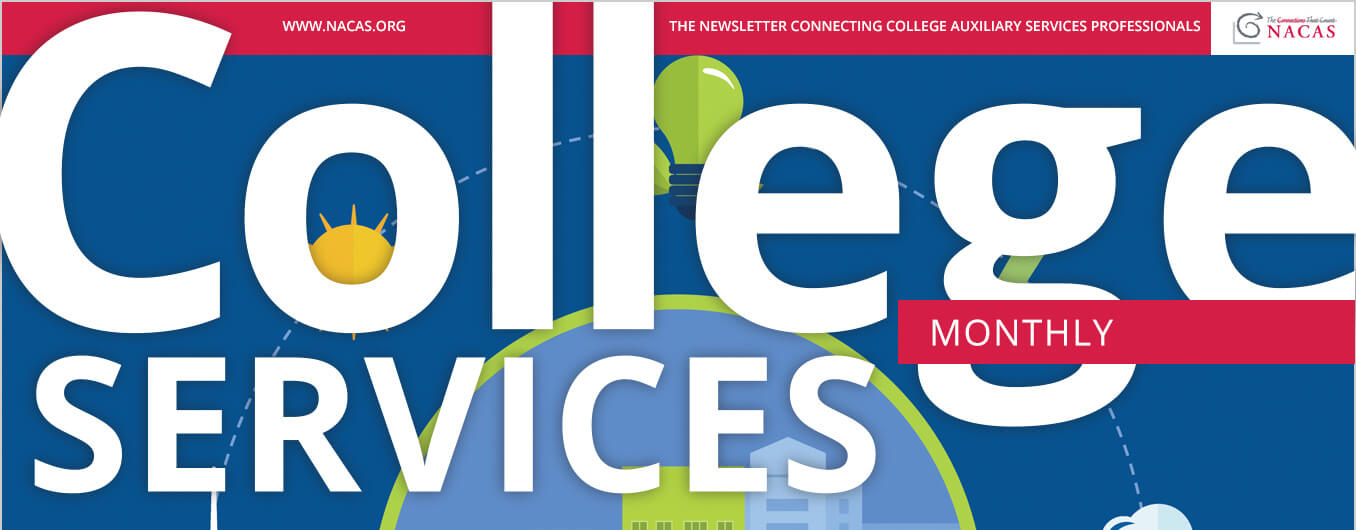
Western Kentucky University gets creative with renovation solutions
![]() Print this Article | Send to Colleague
Print this Article | Send to Colleague
To keep crucial services running, WKU saved time and money by building its own temporary structure to house them.
Candace Ramirez
WKU Auxiliary Services
In 2010, when Western Kentucky University officials planned a two-year, $54 million renovation of Downing University Center (DUC), they knew there would be challenges. Built 43 years ago, the universityís student center was still running much of its original equipment.
Since the building houses services that are crucial to students, including the WKU Store, the I.D. Center, the Post Office, Vending Services, and WKU Restaurant Group, it was not an option to shut everything down during the renovation. They needed a way to feed hungry students throughout the project.
"A decision was made by the student government and student body to allow us to fund a full renovation, and basically take it all the way down to the bones of the building," said Bryan Russell, director of Planning, Design and Construction (PDC). "Inside thereís Fresh Food Company, as well as DUC Food Court, and those serve a tremendous amount of people on a daily basis. So we didnít have anywhere to feed these students during the two-year renovation."
Russell said they decided to split the project into two phases, making it possible to keep food services operational. During the first phase of construction, they would relocate Fresh Food Company, a food service which provides options in the form of mini-restaurants offering different types of cuisine. Then they would return it to DUC and begin the second phase, when they would relocate DUC Food Court until the renovation was complete.
The PDC staff searched for a location on campus to temporarily house the food venues, but found there wasnít one large enough that could be occupied for two years. As a solution, the team considered a temporary facility.
Russell said the first idea they explored was putting up a tent to house the food services.
In researching this option, however, they discovered it wasnít right for WKU.
"We realized itís expensive," Russell said. "We werenít getting exactly what we wanted.
According to Russell, it arrives in pieces on trailers, and most of the cost was providing the infrastructure for that facility. The kitchen is brought in on trailers, and all those trailers had to be put on foundations, and they all had to be hooked up to electric, sewer, water, and power. The university was still responsible for putting the concrete pad down.
"It wasnít going to work for our needs," said Russell. "It had worked in other places, but it wasnít going to work for us."
Adding to the list of drawbacks, the tent wouldnít have had restrooms, meaning WKU wouldíve had to provide an outside restroom trailer, which wouldnít have been ADA accessible.
Instead, PDC bypassed the tent option, and built its own temporary structure--one that met all of WKUís needs in less time and for less money.
WKU hired JK Construction and Scott, Murphy & Daniel LLC to build a 17,000-square-foot steel building, named Topper Café, on South Lawn, a field on campus used for outdoor events and a hangout spot for students.
"We delivered that building on time, and compared to the other option, for about $700,000-$800,000 less. We got the things we needed for our campus, but we also delivered in a very short time frame. It took us six months or less to build."
The structure measures 190 feet by 90 feet and features fully functional restrooms, 550 indoor seats, and outdoor seating.
After the renovation is complete in May 2014, the steel building will be disassembled and sold back to Scott Murphy & Daniel LLC, the company that erected it. Once itís gone, South Lawn will be restored for student enjoyment.
"We wonít have a use for the building at the renovationís end, so we put in a request for proposals for this building so the company could buy it back, disassemble it, and take it," Russell said. "Itís getting repurposed. Itís not just going to a junkyard."
Because the building will be resold, PDC had to keep it painted white. To make it look appealing to visitors, they designed a removable wrap featuring the universityís signature red hue and a collage of photos they felt represented the spirit of WKU.
After the planning, design, and construction processes were completed, it was time to move Fresh Food Company into its temporary home.
"It was a lot of planning, but I donít think the move was very difficult," said Beth Barth, director of operations for WKU Restaurant Group. "We have a great team. Theyíre very organized and had a well-thought-out plan."
Barth said the move was quick and effective.
"We were able to get a truck on Friday, and we served breakfast on Sunday morning," she said. "Thatís a testament to the team and the communication that goes on about what can we do and when we can move things in, and how we make things work. They did it in no time."
The change was well-received by students and other visitors who keep Topper Café operating at or near capacity.
"I think everybody was pleasantly surprised," Barth said. "I think people did expect a tent or something that seemed very temporary, and when you look at that facility you donít think temporary."
Fresh Food Company was only the first part of the job, though. After a year in the temporary structure, phase one of DUCís renovation is complete, and itís time for the switch.
Fresh Food Company will move to its improved space in DUC, and DUC Food Court, which includes Izziís Express, Papa Johnís, Chick-Fil-A, and Topper Grille, will occupy the temporary structure during phase two.
"Most of the work is done because the bulk of the equipment is going to be reused," said Dan Chaney, project manager for PDC. "Thereíll be some cosmetic work to create the four venues as best as we can. Weíll give those things a different look, with most of the back-of-house equipment staying where it is."
Chaney said the switch will be completed in three weeks.
"Itís going to be a little intense," he said. "Thereís a lot of electrical work, but other than that thereís no real plumbing or HVAC or anything like that. Itís just cosmetic and electrical, and then I have to get some equipment moved."
PDC planned for the switch from the beginning, coordinating existing equipment to make the change as simple as possible.
Nena Shomler, director of marketing for WKU Restaurant Group, said Kevin Yaste, design manager for SE Engineering, was key in executing the move.
"Kevin understands what we do in our food service and was able to look at our equipment, and say, ĎOK, I can move this, this, and this, and it will fit into this space, and this is how that can work," Shomler said. "When we worked through a huge list of equipment with Kevin, we said, ĎIn this area, this equipment functions as a pizza kitchen, and in year two it will be Papa Johnís.í Itís why the grill is there because in year two we knew we would be using that as a grill. We knew the diner area would function as ChickĖFil-A in the following year."
Once the DUC renovation is complete, the remaining four venues will move into their updated spaces, and the building will reopen as a fresh and inviting center for students. Its appearance wonít be the only change though--itís getting a name change too. The Council of Academic Deans voted to call it Downing Student Union.
The temporary structureís success attracted attention from other universities planning similar projects, including Old Dominion of Norfolk, VA. The school sent a representative to tour the facility with Gary Meszaros, assistant vice president of Auxiliary Services.
"They were impressed," he said. "They wanted other options besides the tent. So they came and toured with us, and we started preliminary negotiations on selling them some of our equipment that we wonít need once the temporary dining facility is gone."
Russell said that for WKU, building the temporary structure independently was a win-win.
"It has proven to be very effective," he said. "It ended up being less expensive. It allowed us to control our destiny and deliver on time."

For more information visit: www.nacas.org


